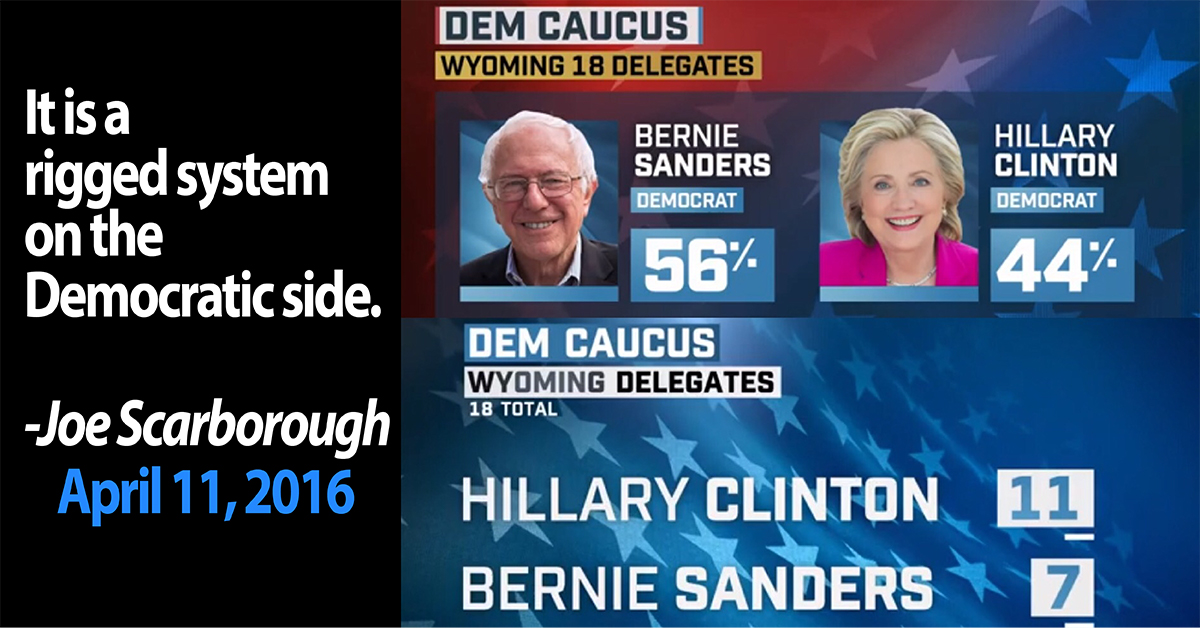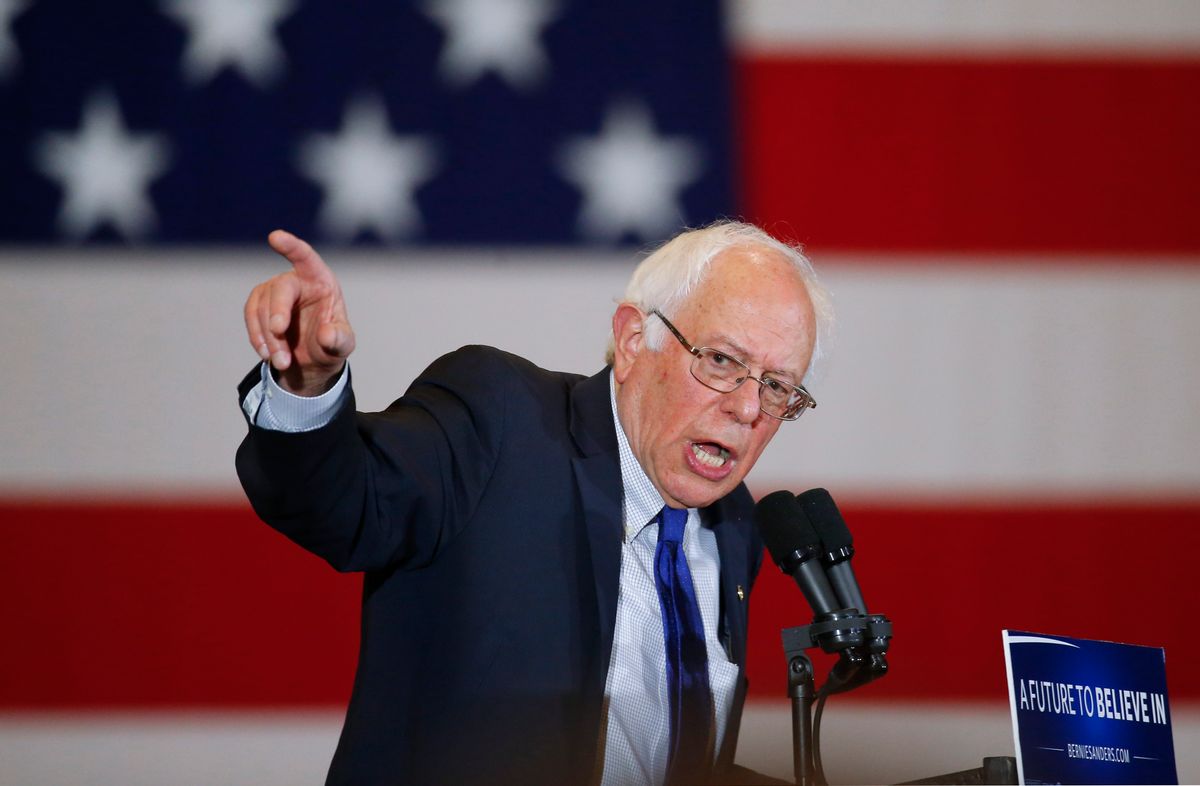When the 2016 primary season began, the last topic I thought we'd ever cover in depth here was the Wyoming caucuses. There are, like, four people in the entire state, and three of them are Cheneys. Nevertheless, here we are, and following the Democratic caucus there, several ongoing myths have boiled to the surface again, demanding a proper busting. Unfortunately, most of the myths are being actively marketed by supporters of Bernie Sanders, as well as a prominent cable news conservative.
On the one hand, I get what's happening. Bernie supporters are seeing their candidate's window for victory rapidly closing, so they're pulling out all the stops to defy the pundits and to keep their revolution afloat. On the other hand, it's difficult to see the long-term upside in virally spreading myths about the voting process on the Democratic side -- especially knowing how many legitimate issues there are with casting ballots in America, many of which are currently on display in Maricopa County, Arizona, along with other red states where the GOP has eroded the integrity of the process to third-world banana republic status.
At this stage of the game, Hillary Clinton has a relatively insurmountable lead on pledged delegates. 1,287 to Bernie's 1,037. Add the superdelegates so far and Hillary's lead broadens to 1,756, while Bernie's 31 superdelegates bring him to 1,068. But in the wake of Wyoming, the notion of a rigged election favoring Hillary has resurfaced, and it's being egged on by MSNBC's Joe Scarborough who said, Monday morning:
“Bernie Sanders won Wyoming by 12 percent, but he might not even pick up a single delegate. Hillary Clinton was awarded 11 delegates, Bernie Sanders only seven,” Scarborough said. “Why does the Democratic Party even have voting booths? This system is so rigged.”
First of all, it was Scarborough's own network that "awarded" Hillary's 11 delegates by counting the four superdelegates who've expressed their support for the frontrunner already. Take away the four superdelegates and Hillary came away with seven delegates. Bernie, likewise, won seven delegates, making the outcome an even split, in spite of the 12 percent popular vote margin in favor of Bernie. Scarborough, being a former member of Congress and a professional political commentator, should also know by now that delegates aren't awarded by straight-up popular votes.
Consequently, the following meme is being circulated throughout social media by Bernie Sanders supporters:

This brings us to the myths.
1) MYTH: Statewide popular votes precisely determine the delegate split. This myth essentially goes like this: whoever wins the popular vote should've received a proportional number of overall delegates, even though that's not exactly how delegates are distributed. Proportional, yes. But not according to statewide results. It's like the difference between the electoral vote and the popular vote in the general.
So, contrary to the conspiracy theory that Hillary and Debbie Wasserman-Schultz are "rigging" the primaries against Bernie by awarding Hillary with delegates she didn't earn, the rules for splitting delegates were approved well in advance of the primary season. In fact, there was plenty of time for Bernie Sanders and his advisers to familiarize themselves with the rules since the latest version was approved by the DNC back in August of 2014.
The short version goes like this for Wyoming.
The state has a total of 14 pledged delegates, linked to the 23 caucuses throughout the state's single congressional district. There are, of course, four superdelegates on top of the 14. The 14 pledged delegates, however, are broken down like so: there are eight delegates awarded based proportionally on the votes in each of the 23 caucuses. Two delegates are "at large" delegates, split proportionally statewide. And four are known as "Party Leaders and Elected Officials" (PLEOs), which are also split proportionally. Consequently, even though Bernie won the statewide popular vote, 55 to 44 percent, Hillary won some delegate-rich caucuses, especially the Laramie County caucus, home of Cheyenne, the state capital. Meanwhile, there were more than a few counties where the vote split was exactly even -- tied. Hence the discrepancy between the statewide popular vote and the seven-to-seven split on pledged delegates.
The rules are complicated but they're standard for every state, and published well in advance of the election. Are the rules contrived? On the surface, it seems so. Are they corrupt? No. And they wouldn't be defined as corrupt if Bernie were leading the delegate count. That said, if the Democrats had winner-take-all primaries instead of complex proportional allotment of delegates, Bernie would likely fare a lot worse in terms of the total delegate math, given how Hillary has won the popular vote in more states, and many of those states being highly populated ones with more delegates to win. In this respect, the allegedly "rigged" proportional system is actually helping Bernie.
2) MYTH: Superdelegates should only vote for whomever wins their state. This one's a lot easier to debunk. As we speak, Bernie supporters are fanning out across the internet to hector superdelegates into switching their endorsements to the candidate (Bernie) who won their state. In the case of Wyoming, all four superdelegates have already endorsed Hillary, and not the popular vote winner, Bernie. Essentially, Bernie supporters want superdelegates (strictly the ones applicable to Bernie's advantage) to behave as at-large pledged delegates and not superdelegates. But there aren't any rules or traditions, dating back to 1984 when the superdelegate system began, in which they're obligated to vote based on the popular vote outcome of their state. Nothing.
In fact, the purpose of the superdelegates is to act as a nuclear option to prevent a disruptive, self-defeating Trump-style candidate. At a glance, this sounds anti-democratic, potentially stripping the nomination away from the popular-vote winner. This leads us to Myth #3, which is...
3) MYTH: Superdelegates are evil. We've all seen the garment rending. The superdelegates, they say, are anti-democratic weapons of the establishment -- except when the superdelegates can be exploited to Bernie's advantage. First, let's get this out of the way: Bernie Sanders is a superdelegate. That not only means he's part of the establishment, it also means he's part of the anti-democratic establishment plot. Bernie supporters have made lots of noise about how the superdelegates will swing to Bernie when they finally come around to recognizing his momentum. Likewise, as we've already discussed here, the superdelegates should only support whomever won their state. So, given how Bernie only has 31 superdelegates, he'd have to pick off Hillary's superdelegates ostensibly from states where Hillary won the popular vote. Put another way, you can't be revolutionarily opposed to the establishment while also manipulating it to your candidate's advantage.
And regarding the anti-democratic thing, the superdelegates have never once overruled the candidate with a pledged delegate majority.
4) MYTH: Southern primaries are irrelevant. Bernie Sanders said as much the other day. On Sunday's "This Week," Bernie was asked about Hillary's lead, to which he replied, "Well, she is getting more votes. A lot of that came from the South."
It's not the first time Bernie's campaign has made this distinction, indicating that because many red southern states aren't winnable for the Democrats in the general, Hillary's wins there aren't as important as Bernie's northern victories. The fact remains that some southern states won by Hillary, North Carolina and Florida in particular, are crucial general election swing states -- but that doesn't appear relevant to Bernie and his people. Likewise, Wyoming, Utah, Alaska, Idaho and Oklahoma, each of which were Bernie victories, are red states that probably won't go Democratic in November.
Furthermore, Hillary's red state victories were driven in large part by African-American voters. It's probably not a good idea for Bernie to continue discounting the support of this particular voter demographic, knowing how GOP governors in those states are actively disenfranchising African-American voters.
By the way, because of the aforementioned proportional delegate distribution, Bernie's won more than a few delegates from those southern states. Should he forfeit them because they don't come from traditionally blue states? Also, Hillary has either won or is leading in the largest and most important states in the general: Ohio, Pennsylvania, California, New York and the aforementioned Florida. If we're disqualifying Hillary due to her southern victories in red states, should Bernie be disqualified because he's failed to win many of the big blue states important in November? No, because the primaries are only partially about forecasting the general election. Bernie should know this.
Overall, the news media needs to do a much better job at outlining the rules and the political reality behind the current system. And none of this is to suggest that the system is flawless. It's far from it. But the perpetuation of various myths about the system tends to distract from the actual problems, many of which circulate around the existence of voter ID laws, voter purges and long lines at polling places due to GOP trickery.

Shares